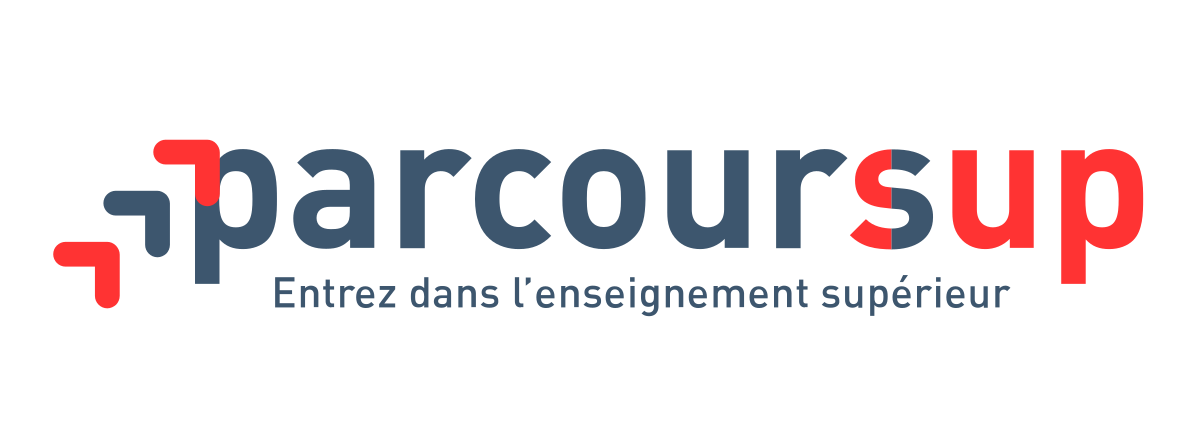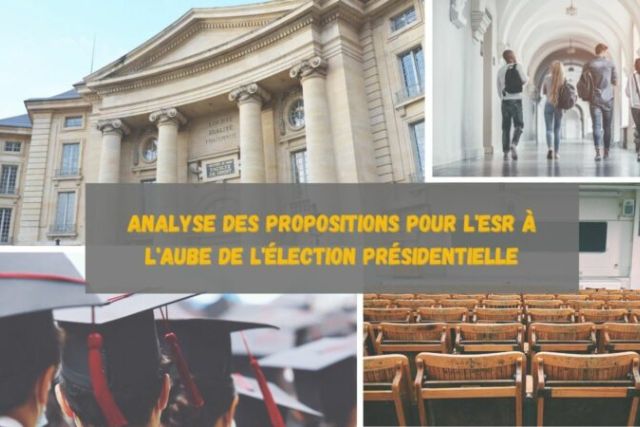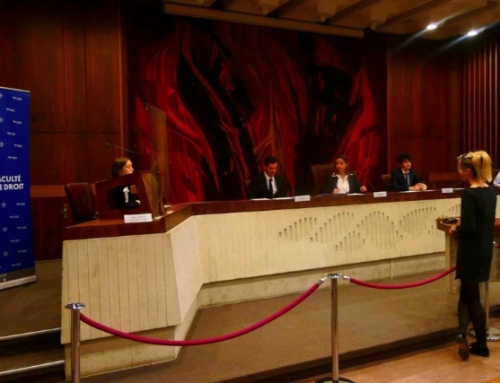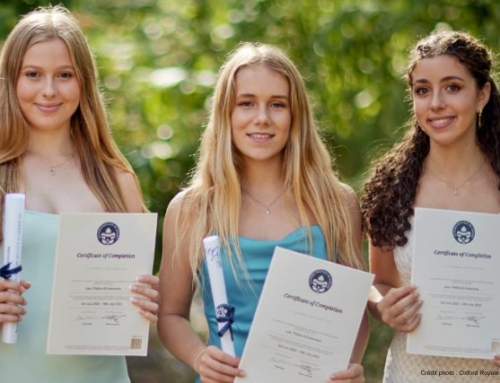Simone et les Robots is obviously listening to the candidates in the presidential election, the first round of which takes place on April 10. What do they propose in their program that would be likely to change the landscape of Higher Education in France, but also significantly improve the living conditions of nearly 3 million students, who everyone agrees have suffered heavily from the health crisis over the past two years?
With 35 days to go before the first round of voting, let’s take stock of the major issues raised by the various candidates, and compare them with the proposals put forward by France Universités and with the findings of the Court of Audit in its recent report. Our aim is to present an overview (albeit partial) of the place of our universities in the country’s future, in the eyes of those who are vying for the supreme mandate.
Earlier, at the start of 2022, France Universités called for a reconsideration of the resources allocated to higher education: “Massive investment is therefore necessary if France is to retain its place among the great scientific nations. The main focus must be on universities, which have been inadequately supported for too long, while at the same time being overloaded with new missions…”. This observation is shared by the Court of Audit, which points out that “in comparison with the OECD, France’s spending on higher education in 2018 was in line with the average for member countries, at 1.45% of gross domestic product (GDP). However, this ratio places it far behind the United States, the United Kingdom and Norway, which exceed or are close to 2%.”
However, not everything boils down to an increase in public spending, nor to the question of resources. In fact, this is where we expect candidates to demonstrate both imagination and a keen understanding of the expectations of the various players involved.
What are the main higher education issues being addressed in this campaign ?
1 – Student living conditions are a subject that attracts the attention of almost all candidates.
Should this be seen as an electoral message aimed at young people, or a genuine concern following the many calls for help from the student community ?
A number of candidates are calling for the introduction of a minimum income to be paid either to students only, or to all those over 18, as proposed by Anne Hidalgo and Yannick Jadot. But at what level would this income be set? Yannick Jadot, Fabien Roussel and Jean-Luc Mélenchon specify an amount, the first setting what he calls a “commitment income” at 800 euros, the second at 850 euros for all students, and the third providing for an autonomy allowance of 1,063 euros from the age of 16.
As for Marine Le Pen, she raises the possibility of creating a “state bonus” for working students, which introduces a strong differentiation between those who would have the means to finance their studies without working and the others. For her part, Valérie Pécresse is talking about the creation of a state-guaranteed student bank loan, without means-testing, which seems inspired by the practices of Northern European countries (Sweden, Norway, Finland, in particular).
As for Emmanuel Macron, he is proposing to reform the scholarship system, certainly to broaden and relax the conditions of access. At present, many students do not benefit from this financial and social cover, which is essential for many of them.
It is particularly interesting to analyze the very diverse proposals put forward by the candidates, placing them in a context clarified by a study by sociologist Jules Donzelot.
He tells us that in France, in 2020, the average student income is 920 euros per month (taking into account grants), and families contribute an average of 386 euros to this monthly income (i.e. almost 42% of the total). Income disparities therefore automatically generate greater difficulties for students from modest families.
In Northern European countries, the allocation of a guaranteed student loan is the answer to significantly higher university tuition fees than in France. 50% of students in Finland, 70% in Sweden and even 100% in Norway use state-guaranteed universal subsistence loans. But these loans are also indexed to students’ success in their studies. If students pass their exams, the state pays 40% or more of the debt. As a result, undergraduate failure rates are very low, which is another major challenge facing French universities.
But beyond scholarships and grants, other means of financing student life are at the heart of the programs. For example, housing is at the top of the list of concerns addressed by the candidates. Marine Le Pen is proposing to increase APLs by 25%, Fabien Roussel to double the housing stock to 350,000 by 2027 (i.e. almost 6 times more than E. Macron promised in 2017), Jean-Luc Mélenchon to invest in the creation of 15,000 additional housing units each year, while Valérie Pécresse and Yannick Jadot are thinking of levying a minimum amount on the quota of social housing built or to be built.
On this point, Emmanuel Macron spoke of the need to resume work on student housing, and in particular to achieve the 60,000 housing units promised in 2017, of which only 34,000 are currently in the ground.
2 – University capacity remains an unavoidable subject of debate every year, and even more so during the current electoral period.
The facts speak for themselves: French universities are welcoming more students every year. A total of 1.7 million students are enrolled in 68 universities across the country, including the French overseas departments and territories.
On this point, Yannick Jadot is the most ambitious, putting forward the figure of 100,000 places to be created to accommodate future students on campus. Éric Zemmour focuses on the healthcare sector, proposing to double the training capacity for doctors. Jean-Luc Mélenchon remains committed to the idea of increasing intake capacity in order to avoid any form of selection at university entrance, while on the other hand Éric Zemmour is in favor of selection at bachelor level and raising the level of the baccalauréat. Finally, Fabien Roussel proposes building 4 new universities to increase overall intake capacity.
For its part, France Universités would like to consolidate the professionalization of the 1st cycle by opening 50,000 places over 5 years in Bac+1, BUT and Licence Professionnelle programs, and by ensuring the sustainability of intake capacities in the second and third cycles by proposing the creation of 25,000 places in master’s programs, and 10,000 doctoral contracts over 5 years.
But isn’t the issue more broadly one of reflecting on the orientation of young people, by imagining that the pursuit of studies in higher education is not an obligatory step for everyone? The image of level 3 vocational training courses is being repositioned by the professional reorientation of young adult graduates who, eager to give meaning to their work, are turning towards more manual occupations or those closer to nature.
3 – Students’ mobility
If we listen to some of the candidates, there’s something there. At a time when student mobility has come to a spectacular halt against the backdrop of the covid-19 crisis, Marine Le Pen and Éric Zemmour agree in calling for foreign students to “return home” after their studies.
However, Jean-Luc Mélenchon is proposing to repeal the increase in tuition fees for foreign students, while Valérie Pécresse wants their presence in universities to be conditional on their participation in compulsory tutorial and practical classes. Candidate Mélenchon also proposes the creation of a Francophone Erasmus and a Mediterranean university alliance, underlining the universal vocation of French higher education.
Finally, on the question of territorial mobility, Marine le Pen proposes free train travel for the under-25s, while Fabien Roussel imagines a free driving license for the same young people, since “autonomy depends on mobility.”
4 – Should Parcoursup be scrapped ?
On the left, Anne Hidalgo, Yannick Jadot, Fabien Roussel and Jean-Luc Mélenchon are particularly clear on this theme, as they all call for the outright abolition of Parcoursup. Others are more moderate, recognizing that there are corrections to be made, from the end of positive discrimination evoked by Éric Zemmour, to the transparency of the algorithm called for by Marine Le Pen or Valérie Pécresse.
The French head of state also acknowledges that the system is not very transparent, difficult to understand to say the least, and consequently a vector for a feeling of injustice that the population finds hard to bear. Does this mean it should be abolished?
5 – Employability and professional integration as a priority for university education
Valérie Pécresse (former French Minister of Higher Education, Research and Innovation) is very firm on this point, which was raised at Emmanuel Macron’s conference with France Universités in January. This must be the absolute priority of future reforms. The Republican candidate, for example, wants to “make it compulsory for all training courses to evaluate the professional integration of graduates, and make the opening and maintenance of a diploma course during the contractualization process with the Ministry conditional on satisfactory rates of professional integration.”
Anne Hidalgo, for her part, calls for the generalization of work-study programs, so that students can “start earning a living and integrate professionally”. Candidate Macron remains more evasive for the moment, although he too proposes “evaluating universities on their professionalization”.
Jean-Luc Mélenchon is focusing his strategy on vocational training courses such as NVQ, vocational baccalaureat and HND, with plans to open “new polytechnic vocational centers, in order to network the national territory with establishments integrating high school and higher education”. It also calls for more places to be guaranteed for technical and vocational baccalaureate holders in BTS and professional license classes.
But professionalizing universities also means opening them up to the business world. With this in mind, Valérie Pécresse is proposing to involve representatives of local business sectors on University department boards of directors. She calls for the creation and integration of modules dedicated to innovation and entrepreneurship in all training courses.
On the subject of guidance, we’ll be interested in Emmanuel Macron’s declaration to totally rethink the link between high school and university, while Anne Hidalgo likes to imagine that 80% of an age group would graduate from higher education.

6 – New resources for the university
Increased budgets and funding for research are the goals of every election campaign. It’s hard to disagree, but even harder to find original alternatives.
While Anne Hidalgo proposes reforming the research tax credit to support research and “catch up with France”, Jean-Luc Mélenchon points out that the 7 billion euros of GDP should be channeled directly into research. He also talks of the need to increase research and development resources by allocating “3% of GDP to the budget, while giving priority to recurrent, long-term funding.”
Taking up the challenge of continuing education as a means of developing university resources is a more original (though not new) direction set out by candidate Emmanuel Macron, who wishes to encourage universities to take responsibility for Lifelong Learning in order to increase their revenues. Universities are undoubtedly in the best position to provide training tailored to the career changes that so many French people want to make and experience throughout their working lives. The private market should not be the only beneficiary of this major trend, which reflects the growing flexibility of corporate career paths.
In fact, this is what the Court of Audit report says when it refers to “continuing education, the benefits of which could, thanks to a desirable change in regulations, be paid into the general budget on the basis of coherent and rational pricing for each course”.
7 – Investment in higher education establishments and personnel in France
As President said in his vision for the country, we urgently need to embark on a new policy of investment in higher education over the next ten years. Beyond this declaration of intent, what measures have the candidates proposed in this area?
Jean-Luc Mélenchon estimates that 30,000 teacher-researchers will need to be recruited over 5 years, and also proposes the tenure of “precarious” staff. But he goes even further, including in his program a 10 billion euro allocation to renovate and build new university buildings. Fabien Roussel, for his part, suggests increasing the higher education budget from 14 billion to 20 billion euros, an increase of 43%.
In its report, France Universités specifies that it would be useful to “roll out a major renovation plan for university property, fully integrating energy efficiency issues and diversifying financing levers, in particular by opening up the borrowing capacity of establishments”. However, there is no mention of a specific budget envelope.”
While candidate Emmanuel Macron is inviting universities to gain greater autonomy by calling on more private funding, he doesn’t really specify what investments are feasible in the short term. Valérie Pécresse naturally advocates moving to stage 2 of university autonomy, without specifying the impact on potential private investment. The other candidates are very discreet about extending autonomy.
Conclusion :
It’s easy to see that, over and above the speeches aimed at young voters and staff who are very sensitive to the difficulties heightened by the health crisis, all the candidates are concerned with meeting the needs and expectations of the universities, a major asset of our education system. With student living conditions having deteriorated sharply in recent years, there is an urgent need to find innovative solutions and get things moving. Nevertheless, the quality of teaching and the adaptation of training to the demands of business require major investments in equipment, staff and training.
Have the candidates taken the measure of the situation? Are they ready to make a program to revitalize higher education a top priority in their next term of office? There are less than 35 days left to assess their intentions and take a stand.
You’ve seen the proposals for higher education put forward by the presidential candidates, but what are EdTech really waiting for? Anne-Charlotte Monneret, General Delegate EdTech France, tells us more here!








